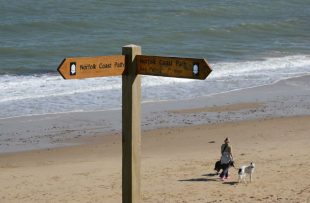In today's blog we cover Minister Eustice's visit to one of our future farming events, the England Coast Path in Norfolk, cracking down on fly-tipping and mining development in the Pont Valley.
Minister Eustice speaks to farmers in Berkshire on the consulation

Farming Minister George Eustice today attended one of our future farming events, co-hosted with the Soil Association, to discuss our consultation (Health and harmony: the future for food, farming and the environment in a Green Brexit) and our ambitious plans for a new agriculture policy once we leave the EU.
Today’s event, held at Sheepdrove Organic Farm in Berkshire, provided an opportunity for representatives of the food and farming sector in the local area to share their views on the consultation, which focuses on rewarding farmers for the work they do to enhance the environment and support other public goods.
Farming Minister George Eustice said:
Leaving the EU gives us the opportunity to design an agricultural policy that is tailored to the needs of the UK for the first time in almost half a century.
As we develop future schemes to improve farm profitability and to enhance the farmed environment it is crucial that the ideas of individual farmers are heard.
Today’s event is one of a series of stakeholder events taking place across the country during the consultation period, which runs until 8 May.
England Coast Path in Norfolk

This weekend there was coverage in the Sunday Times on the England Coast Path, amid concerns from Norfolk residents its creation will restrict access to surrounding salt marshes.
Under the England Coast Path legislation, whenever a new section of coast is opened, the land between it and the sea becomes “access land”, making it open to anyone. In turn, these laws also allow Natural England to restrict access to some areas, for example, those deemed sensitive for wildlife. Natural England is currently consulting on proposals for a stretch of coast between Weybourne and Hunstanton, and the article reports the plans to restrict coastal access rights on two areas of saltmarsh at Wells and Burnham Overy have prompted concerns from local residents.
To be clear, these proposals have been developed to both protect the environment and for reasons of public safety. When developing the proposals, Natural England gathered information from local interest groups and the coast guard to establish which areas of salt marsh were being used safely, and which areas could pose issues. Natural England has been clear this would not affect existing agreements on access to the marshes, which could include informal agreements with local landowners or access for common rights holders.
Furthermore, before establishing any stretch of the England Coast Path, Natural England takes the time to listen to people to make sure that route proposals strike a fair balance and have the minimum impact. We work closely with farmers, landowners, and occupiers to ensure they have the opportunity to discuss their views, concerns, and potential options for the route.
If during this process we identify that there may be potential for coastal access rights to cause negative effects on the environment, or pose safety issues, we consider whether actions must be taken – as is the case here. Stakeholders and interest groups are always consulted, and our policy is to adopt the option which is least restrictive on public access, while still meeting our environmental objectives.
People have until 16 May to comment or make representations on this stretch of coast in Norfolk, and can do so here.
Householder fines for fly-tipping
There is coverage in the Daily Mail, The Mirror, The Guardian, and The Sun following a Westminster Hall Debate last Tuesday on cracking down on fly-tipping and Government’s recent consultation on bringing in £400 fines for householders who use rouge ‘man with van’ rubbish distributors – even if they didn’t do the tipping themselves.
The coverage notes the new fines will make it easier for councils to tackle fly-tipping and provide an alternative to putting cases through the courts which can be lengthy and costly, and The Sun reports government has been clear that these fines should not be used as a means of raising revenue.
Speaking at the Westminster Hall Debate, Minister Coffey said:
There is an obligation to use the correct [waste carrier] otherwise people can actually be convicted, but the reason for introducing fixed penalty notices is it tends to be a far more straight forward way for councils to try and deter.
I am very keen that we continue to raise awareness that householders must look into who is disposing of their waste, because at the moment our assessment of fly tipped waste is the two thirds of if coming from private householders.
Subject to consultation, the new fines are expected to come in later this year and be up to £400 – the same amount as for fly-tipping itself.
Householders can check certified waste carriers on the Environment Agency website.
Since 2014 the Government have given the Environment Agency an additional £60 million for waste crime enforcement work up to 2022, including £30m in last year’s November budget.
Mining development in the Pont Valley
A story has been running in regional press in the north east regarding development at a site in Pont Valley, County Durham. A mining firm plans to open a mine on the site however campaigners set up camp in order to prevent work from starting. Last week the protestors claimed that they had found a Great Crested Newt on the site and accused the company of committing a ‘wildlife crime.’
Natural England was first contacted by the developer about this site last year as they were seeking reassurance that the approach they were proposing in relation to protected species, and great crested newt in particular was appropriate. We provided advice at the time, which the developer took into account. A number of surveys have taken place over recent years, which have shown the population to be declining to the point where the survey in 2017 showed there were no newts on site. As a result the developer and their ecologist determined that a protected species licence was not required, and so have proceeded on that basis. With no licence in place, it is not within Natural England’s remit to investigate allegations regarding sightings of great crested newts on this site.
We have provided a statement to a number of regional outlets on this issue, as below. We will not be providing further comment.
A Natural England Spokesperson said:
An environment survey was carried out on the site last year by an independent ecologist. Banks Group approached Natural England to check the interpretation of this initial report which found no evidence of Great Crested Newts on site.
If Great Crested Newts are found on a site the developers must take action and ensure they are not in breach of any wildlife legislation.